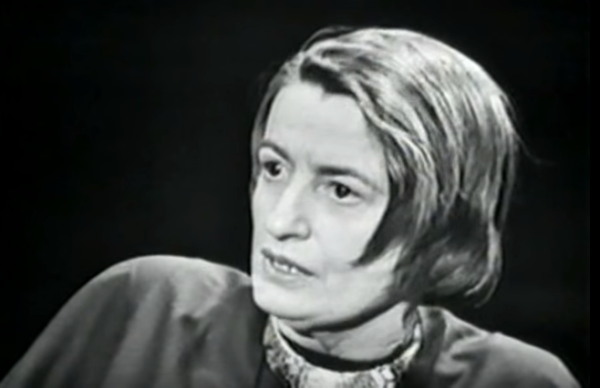
Image via YouTube, 1959 interview with Mike Wallace
Finally bowing to public pressure, the Trump administration, has revealed which companies received loans from the Paycheck Protection Program (PPP) created to support small businesses during COVID-19. To no one's surprise, the published list apparently includes a host of privileged entities: the shipping business owned by Mitch McConnell's wife Transportation Secretary Elaine Chao; businesses associated with members of Congress (from both parties); the law firm of David Boies; elite private schools like Sidwell Friends and Saint Ann's; Grover Norquist’s Anti-Tax Group; the law firm run by Trump’s longtime personal lawyer, Marc E. Kasowitz; billionaire Kanye West’s company, Yeezy; a venture that raises money for Trump’s campaign and the RNC, etc.
Add to the list the Ayn Rand Institute--an organization named after Ayn Rand, the Russian writer who exalted the self-reliant individual and criticized social welfare programs that support the vulnerable. As she wrote in The Virtue of Selfishness, “The right to life means that a man has the right to support his life by his own work (on any economic level, as high as his ability will carry him); it does not mean that others must provide him with the necessities of life.” In short, if you can't make it, you're on your own.
Rand's political theory collapses when it confronts everyday reality. At the end of her own life, Rand, suffering from lung cancer, had to grudgingly rely on social security and medicare to make ends meet. Now, reports Reuters, the institute bearing her name has requested (and apparently received) "a Paycheck Protection Program (PPP) loan of up to $1 million." All while showing no gratitude to the American taxpayer. The Ayn Rand Institute deemed the loan "partial restitution for government-inflicted losses." Some will consider that spin--a way to justify accepting government largesse.
Watching the video below, it seems like a principled Randian would have gone, hat in hand, to a private charity instead.
Related Content:
When Ayn Rand Collected Social Security & Medicare, After Years of Opposing Benefit Programs
The Simpsons Take on Ayn Rand: See the Show’s Satire of The Fountainhead and Objectivist Philosophy
The Ayn Rand Institute Takes a Loan from Paycheck Protection Program is a post from: Open Culture. Follow us on Facebook, Twitter, and Google Plus, or get our Daily Email. And don't miss our big collections of Free Online Courses, Free Online Movies, Free eBooks, Free Audio Books, Free Foreign Language Lessons, and MOOCs.
from Open Culture https://ift.tt/3e8VwkP
via Ilumina
Comments
Post a Comment